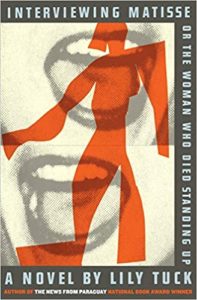
Interviewing Matisse, or The Woman Who Died Standing Up
By Lily Tuck
148 pages
Published in 2006 by Harper Perennial
I decided to read Interviewing Matisse because it was a thin book, just 148 pages, and because George Plimpton, who knows a thing or two about fiction, called it a “tour de force.”
The author had an interesting background. She was born in Paris, earned a degree at Radcliffe and at the Sorbonne, and has lived in Switzerland, Thailand, and (during her childhood) Uruguay and Peru. That, and the title, promised some geographic nostalgia and thought-provoking literary references, which Tuck supplied.
What I was not prepared for was the way it was written. Basically, it’s a single, fractured, conversation by Lily, in the first person, and Molly, talking about their good old pal Inez, who has apparently turned up dead in her apartment, standing in her underwear and galoshes, as if she were welcoming the delivery boy who discovered her.
It’s part murder mystery and part social satire. It’s funny, but smiling funny. No guffaws. It does present a vivid picture of how out-of-touch and airheaded people of a certain privileged social class can be.
It’s not a tour de force, but at 148 pages, it’s worth a weekend afternoon.
Critical Reviews
“Most impressive…. Sharp, funny and strangely affecting…. Highly original…. Wonderful satire.” (Michiko Kakutani in The New York Times )
“Sophisticated and funny…. Tuck gives us… with the skill and technique of an unblinking juggler, a heart-stopping struggle.” (Washington Post Book World )
“What great fun this novel is!… A lovely and engaging tour de force. Hooray for Lily Tuck!” (George Plimpton)
About Lily Tuck…

Lily Tuck’s novel The News from Paraguay won the 2004 National Book Award for Fiction. Her novel Siam was nominated for the 2000 PEN/Faulkner Award for Fiction. Her short stories have appeared in The New Yorker and in her collection, Limbo and Other Places I Have Lived.
“Living in other countries has given me a different perspective as a writer. It has heightened my sense of dislocation and rootlessness…. I think this feeling is reflected in my characters, most of them women whose lives are changed by either a physical displacement or a loss of some kind.” – Lily Tuck
